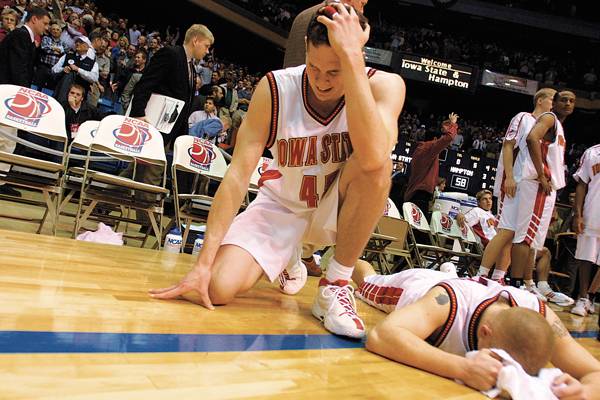MEN’S BASKETBALL: The man behind the controversy

Iowa State players Paul Shirley (45) and Jake Sullivan show emotion after the 58–57 Iowa State upset loss to No. 15-seeded Hampton in the first round of the NCAA Tournament in Boise, Idaho, on March 15, 2001. The Cyclones were the No. 2 seed in the bracket.
February 1, 2010
Editor’s note: This is the first part of a brief series about former ISU basketball player Paul Shirley and his basketball and life experiences. Shirley was notably fired from ESPN last week for comments in his personal blog.
He didn’t want 15 minutes of fame like this.
Paul Shirley stands at 6 feet 10 inches, so he’s used to standing out in a crowd. He played on a Big 12 championship basketball team at Iowa State, and carried his skills to a professional basketball career and, more recently, a music blog that was featured on ESPN.com’s front page every week.
Earning a degree in mechanical engineering from Iowa State, scoring a 35 on his ACT and writing a humorous book about life inside basketball — those are reasons he should have gotten his time in the spotlight, not because of headlines like “Shirley hates Haiti.”
“With regard to the sensationalism of our current time, it’s much easier to point fingers and then run away without actually following up on the real story,” Shirley said last Tuesday, before his personal blog post on Haiti’s earthquake management became national news. ESPN released Shirley last Wednesday, distancing themselves from his opinion and enabling the rumor mill.
Julie Flory, secretary and first-face of the ISU men’s basketball department since 1977, got an acknowledgment in Shirley’s 2007 book, “Can I Keep My Jersey?” and is one of the last remaining figures within the team since Shirley’s graduation in the spring of 2001.
While Flory disagreed with Shirley’s self-noted “minuscule minority” opinion in his Haiti post, she saw him almost daily for five years. She knows he didn’t want this.
“Paul is not like that. Paul is a loving kind-hearted guy. When he writes and when he looks at things, Paul has kind of a natural way of looking at it a little more cock-eyed than you and I do,” Flory said. “Not on everything, but lots of things, and I think part of that is because he has got a lot of creative talent.”
Arriving in Ames in 1996, Shirley was an 18-year-old from Meriden, Kan., and came north for the opportunity to play with coach Tim Floyd. It aided the recruiting process that Paul qualified for a full academic scholarship from his inclusion as a National Merit Finalist, and thus didn’t require an athletic scholarship.
Shirley camped out in the Maple-Willow-Larch complex of residence halls for the first two years of his ISU journey and majored in mechanical engineering while playing for the basketball team.
“After I got into mechanical engineering and looked around and saw that there weren’t any girls, I realized that I had potentially made a mistake with regard to my social future,” Shirley said.
Time management as an athlete is a vital skill on campus, and with a schedule that read like a gauntlet, Shirley forgot all about changing his social future.
“I didn’t have any fun because I was determined to not let myself have any fun,” Shirley said. “It was my own fault. I just exhausted myself with worrying about basketball and class.”
Flory has seen six different head coaches and as many staffs during her tenure in Ames, and she described Shirley as “an extremely hard worker and very self-motivated.”
After two seasons under Floyd and finally working his way into the starting lineup with an eight-point and six-rebound average, Floyd departed to the Chicago Bulls and Shirley was sent into an early form of his mercenary future. The scenery had changed heading into his third year under new coach Larry Eustachy, with a different program direction and a move from the dorms to Campus Ave.
“It’s a little bit more of a job than people realize, and especially when I was there,” Shirley said. “My life was pretty miserable under Larry Eustachy; under Tim Floyd it was perfectly acceptable.
“For Floyd, it was a stop along the way,” Shirley continued. “He had certain goals and kind of wanted to go on to the next thing, and I think he has a little bit of ADD in that he kind of gets bored and wants to go along to the next challenge. I’ve always respected that.”
Redshirting his junior year gave him an adjustment period under Eustachy, and Shirley came back in his fourth year with only one start in his 29 games of action. He shot a strong 60 percent from the field, though. The team finished 32–5, the highest win total in ISU history, and fell to the eventual champion, the Michigan State Spartans.
“It was a great experience in that I got to meet really cool people, and it was really cool that people in Iowa knew who I was, knew who we were, in those days of winning basketball games,” Shirley said. “But it was juxtaposed with those days of getting screamed at on a daily basis and feeling like I wasn’t worthwhile as a human being unless I did my coach’s bidding.”
And this is what takes us back to Haiti. Not literally, but with only bits and pieces of Shirley’s words and thoughts, not everything fits together. There is a complete thought to the ramblings that take two minutes to vent, but, like his book, it comes to an end and the puzzle fits together.
It may not look like the picture on the front of the box, but conversing with Shirley for longer than those two minutes leaves you understanding that an alternative is suitable.
“Again, that stuff is really hard to describe to people, because they say, ‘What are you complaining about, I would give anything to have been in your shoes.’ But if they really were in those shoes, they probably would not have made it, or they probably wouldn’t have enjoyed themselves,” Shirley said. “That just doesn’t work, just coming out of the stands and playing college basketball. There’s a lot of stuff that goes into it.”
Shirley didn’t leave Iowa State with his jersey in the rafters or the star of highlights for an introduction video in which a child oddly caresses his gold No. 45 jersey. His final season was his most productive, starting all 31 games and averaging 10 points and seven rebounds per contest. The team finished 25–6, but with the departure of NBA-bound Marcus Fizer, lost to the No. 15-seed Hampton Pirates in the first round of the NCAA Tournament.
The appeal of Shirley’s order and knowledge of things is the transparency and accessibility his writing provides into the “inside” of basketball life. Hearing him tell how Floyd was forced to explain what a screen was to a naive Fizer, or the fragility of Eustachy’s emotional state, it leaves you feeling like your ear has just been pressed up against your parents’ door. It comes from his willingness to share, but also the complex awareness of simple things in his surroundings.
You can get those observations and stories in his book. But person to person, his experience in and after college gets more interesting than the typical ISU student, and what Shirley tries to do is make them relative to whoever is occupying his old stomping grounds.
“College goes by pretty fast; and I think when you’re in the midst of it, it’s hard to step back and say, ‘This is pretty cool — what I’ve done here is worth enjoying, and I’m not going to worry so much about what the coach is saying or what fans are saying or what radio people are saying,’” Shirley said. “I would tell everybody to try to be driven but also enjoy the fruits of their labors more than I did.”
Ames would not be a goal location or final stop for the wide-sighted Shirley, and his list of current corresponding contacts at Iowa State is made up of Flory and Dr. Tom Greenwald, an orthopedic surgeon that has operated on the power forward three times.
Shirley recommends Hickory Park as his dining pleasure, like most locals and passerby. He says he brought it home to his parents after his last Ames visit.
For a man described as a bigot, racist and privileged jerk — just search recent news with his name — that seems like an incredibly normal thing to do. It seems more than plausible that he’s sitting down two tables away enjoying mashed potatoes and talking about the latest rock concert than leading a eugenics rally.
An exceptional everyman? Perhaps. But it’s a good thing he tries to think of the big picture, because Paul Shirley is 6 foot 10 inches tall and he probably doesn’t fit inside a stereotyped frame.






